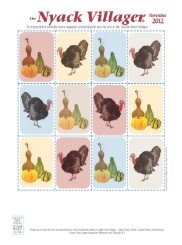MAY '09 - The Nyack Villager
MAY '09 - The Nyack Villager
MAY '09 - The Nyack Villager
Create successful ePaper yourself
Turn your PDF publications into a flip-book with our unique Google optimized e-Paper software.
Pet care<br />
by Peter Segall, DVM<br />
No. 1 and No. 2<br />
It is a fact of nature. You take into<br />
your body food & drink, the body<br />
processes it, and lo and behold!—<br />
the body releases the by-products.<br />
e organs which finally handle these end<br />
products are the kidneys, bladder and colon.<br />
Pathologic conditions affecting theses structures<br />
are very common and make up a good<br />
portion of veterinary practice.<br />
Kidney disease may affect many cats and dogs<br />
as they get older. e kidneys can be affected<br />
by toxins, bacteria, metabolic, congenital disorders,<br />
autoimmune disease as well as simply<br />
old age. Young animals may have a number of<br />
rare conditions that will alter kidney functions.<br />
We are often asked why we recommend blood<br />
testing before performing procedures on<br />
young animals. Anesthetic drugs, in many<br />
cases, need the kidneys to be in working in<br />
order to remove their by-products, which at<br />
high levels can result in damage to the heart<br />
and brain. Doing pre-anesthetic blood work<br />
which shows abnormal kidney functions may<br />
save a life. Lack of a kidney, multiple cysts<br />
which decrease functioning kidney tissue, can<br />
be seen in rare cases.<br />
Many older animals have periodontal<br />
disease. What do gums<br />
have to do with things that affect<br />
internal organs? When tarter<br />
builds up on the teeth it starts to<br />
work its way under the gums.<br />
e gums get red and bleed (gingivitis)<br />
and then become infected<br />
by mouth bacteria. ese bacteria<br />
can then enter the blood stream<br />
and can get filtered out in the kidney and<br />
liver. Many older dogs and cats die of kidney<br />
failure and I believe that the constant bombarding<br />
of functioning units of the kidney<br />
with bacteria causes scar tissue to build up and<br />
affect the ability to filter poisons from the<br />
blood. ese same bacteria can then move<br />
from the kidneys into the bladder and cause<br />
cystitis, a bladder infection. Besides infection,<br />
which is probably the most common bladder<br />
disease, we see a significant number of cases of<br />
bladder stones and bladder cancer. e symptoms<br />
for all of these are straining to urinate,<br />
frequent urination, and possibly blood in the<br />
urine. Bladder stones are formed when the<br />
minerals precipitate out of the urine and form<br />
stones from marble to golf ball size. In a male<br />
dog, sometimes a small stone will get stuck<br />
behind the penis and cause an obstruction.<br />
Surgery is required to remove the stones and<br />
diet changes will help to prevent recurrence.<br />
Bladder cancer usually occurs near the out<br />
flow tract and can make it difficult for urine<br />
to pass. We can treat cancer with drugs because<br />
it is often difficult to remove tumors<br />
surgically.<br />
e last organ to talk about is the colon. e<br />
job of the colon is to remove fluid from the<br />
feces passing through so that the bowel movement<br />
will be formed and come out easily.<br />
Diseases of the colon include colitis, parasitism,<br />
cancer and neurological conditions which impair<br />
the ability to push feces thru. ere are<br />
certain intestinal worms which cause inflammation<br />
in the colon—whipworms in particular.<br />
e symptom is diarrhea, usually with blood.<br />
If dogs eat foreign material (such as grass, paper,<br />
plaster, wood, leaves, etc) may get colitis as<br />
these materials will not be digested and will<br />
rub the colon wall, causing inflammation.<br />
When irritated, the lining of the colon wall<br />
will separate large amounts of mucus and, if<br />
blood vessels are abraded, blood will be present<br />
as well. Dogs and cats also get inflammatory<br />
bowel disease, which is an autoimmune<br />
process. e body perceives the bowel lining<br />
as foreign and attacks it, causing inflammation.<br />
Most of these conditions are treatable<br />
with a combination of diet and medication.<br />
Dr. Segall is a veterinarian practicing at the Pomona<br />
Animal Hospital at 1545 Route 202, Pomona NY<br />
Phone: (888) 309-2570. ✫<br />
16 <strong>The</strong> <strong>Nyack</strong> <strong>Villager</strong> May, 2009
















